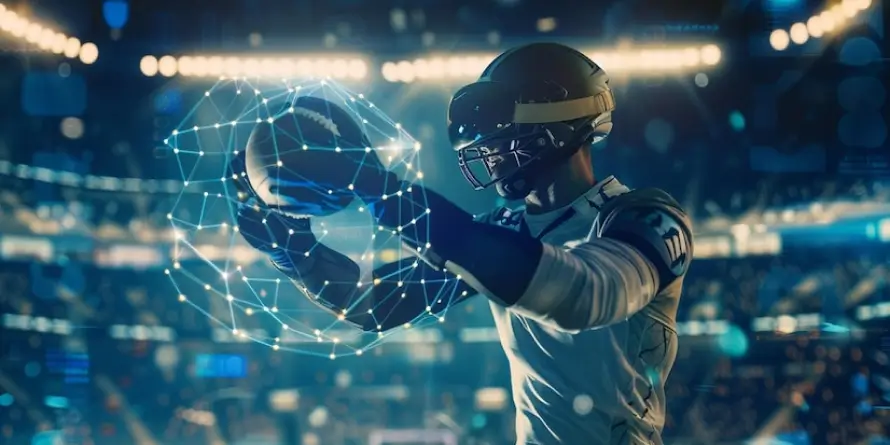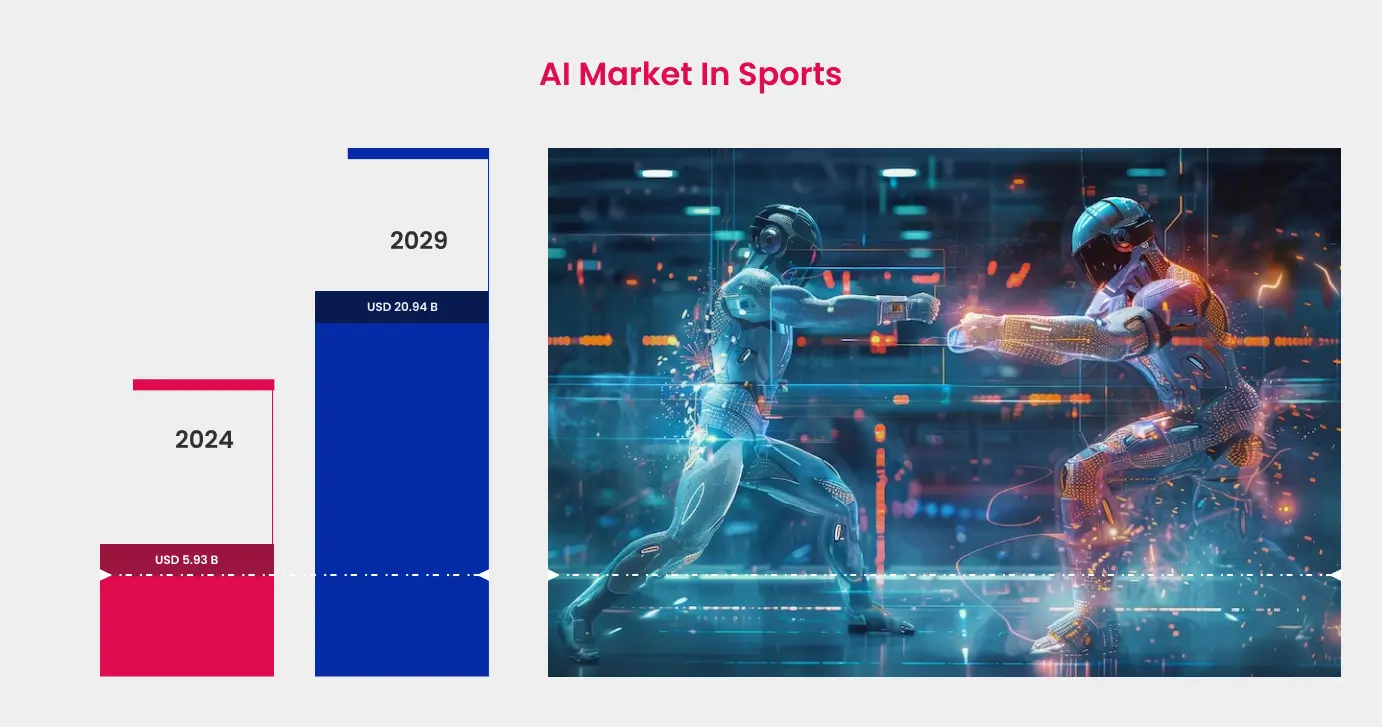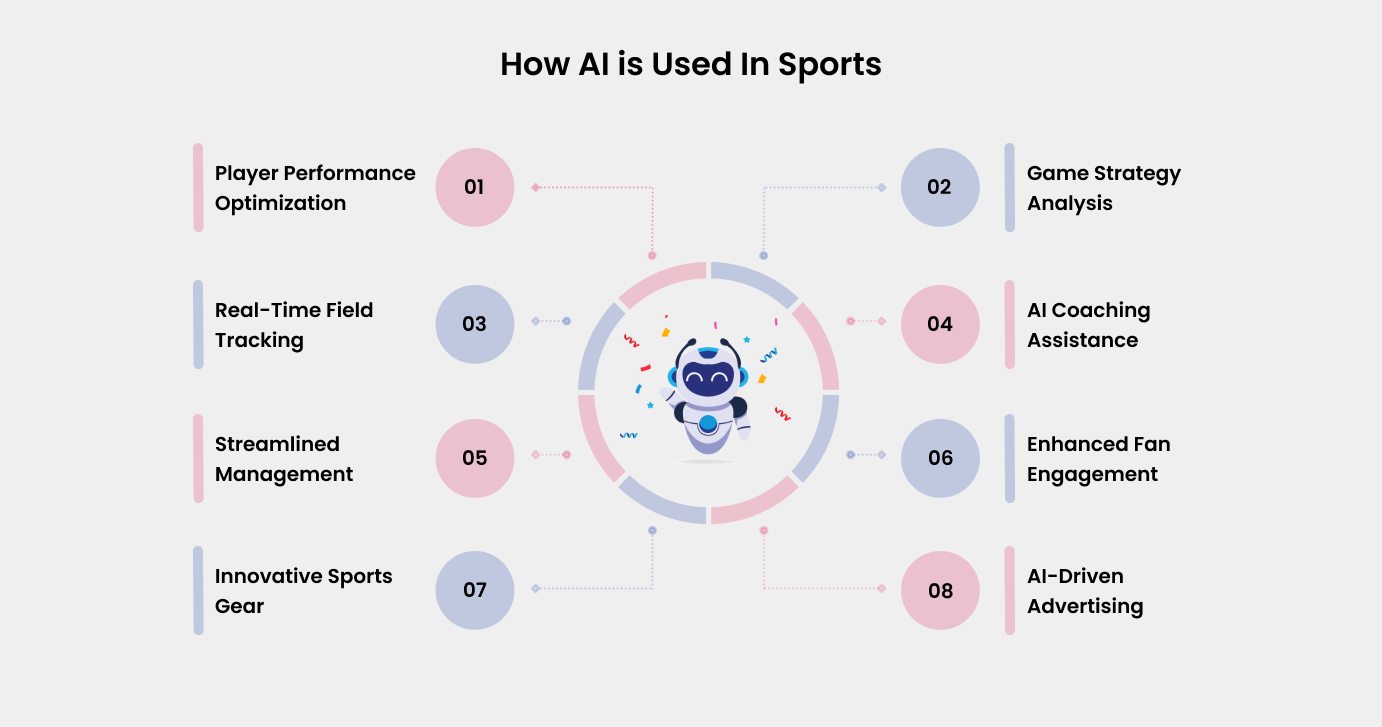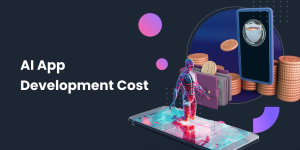AI In Sports: How Artificial Intelligence is Revolutionizing the Sports Industry?

Welcome to a world where every millisecond is making a difference, and every action is being watched closely. Technology is always evolving and is becoming an important part of the sports industry. However, a new player is emerging in the technological demands, with Artificial Intelligence changing the sports industry and making the impossible possible.
Big data and analytics have always been crucial for sports teams to develop a strategic approach. The introduction of AI in the sports industry has undoubtedly changed the way different tactics are applied across various sports. Many prominent clubs, teams, national squads, and coaches are using Artificial Intelligence to track team performance and improve the overall credibility and efficiency of athletes.
Artificial Intelligence helps individuals to make smarter decisions driven by a game-winning mentality. Many AI applications are now being used in the sports sector.
In this blog, we will explore how AI is being used in sports, real-world applications adopted by sports teams and management, and some challenges that may arise while developing a sports app integrated with Artificial Intelligence.
Let’s start with some market statistics about AI in sports to help business owners and sports enthusiasts make informed decisions.
Statistics of AI in Sports Market

(Source: MordorIntelligence)
The AI in sports market is projected to be valued at USD 5.93 billion in 2024, but this is only the beginning. By 2029, the market size is expected to skyrocket to an impressive USD 20.94 billion, with a CAGR of 28.69%.
This growth can be attributed to the adoption of AI in various aspects of sports. While the demand for AI in sports is particularly strong in North America, the Asia-Pacific region is emerging as the fastest-growing market for this technology.
These statistics highlight the potential for businesses and sports organizations to use AI technology effectively.
AI in the Sports Market is Growing to $20.94 billion by 2030.
Integrate With AI Technology, Talk to our Experts, and get an estimated
budget for your AI Sports App.
How AI is Used In Sports?
Artificial Intelligence has revolutionized various sports, including baseball, soccer, tennis, cricket, rugby, and more. With its predictive capabilities, AI enables businesses to make informed decisions.

1) Improving Player Performance
Artificial Intelligence is revolutionizing how player performance is improved by analyzing vast amounts of data and past health reports of athletes.
AI technology provides athletes with customized training programs tailored to their specific strengths and areas for improvement. By evaluating factors such as movement patterns and biometric data, AI provides valuable information to help players elevate their skills.
For instance, in baseball, AI can analyze a pitcher’s throwing technique, enabling them to refine their accuracy and performance. Similarly, in soccer, AI evaluates a player’s speed and stamina, offering specific exercise recommendations to boost these attributes.
This technology goes beyond identifying areas for improvement. It offers practical solutions and strategies to help athletes excel.
2) Game Analysis for Previous Game
When preparing for major events like the FIFA World Cup, Rugby World Cup, Cricket World Cup, or the Olympics, teams need to start strategizing well before the tournament begins.
Gone are the days of spending countless hours manually reviewing opponents’ game footage. With the integration of AI in sports, teams can now analyze past games with incredible precision.
AI algorithms process extensive datasets to identify key plays, mistakes, and patterns that might otherwise go unnoticed. For example, rugby teams can use AI to analyze scrums and lineouts, finding trends and insights that can refine their approach.
By using these insights, coaches and players can adapt their strategies and improve their game plans for future matches, turning every game into a valuable learning experience.
3) Real-Time Field Tracking
Once the game begins, catching every detail and developing a winning strategy within minutes is a challenge. However, AI technology is revolutionizing the way we watch and understand sports.
AI-powered sensors and cameras track every player’s movement, providing real-time data on their positions, speed, and even fatigue levels.
Referees and umpires also benefit from AI, which helps in making accurate and fair decisions. For example, in soccer, AI is used to determine offside calls, while goal-line technology ensures precise judgment on whether a goal has been scored.

4) Coaching Assistant
AI is becoming an invaluable tool for coaches, providing insights that go far beyond the limits of human observation.
AI-powered tools analyze various aspects of the game, including player performance and team dynamics, offering actionable suggestions to help coaches refine their strategies.
Many football clubs are now partnering with AI development companies to integrate real-time analytics into their coaching platforms. For instance, Liverpool FC has collaborated with Google DeepMind to develop TacticAI, an AI assistant designed specifically for football tactics. This innovation is likely to revolutionize the way football matches are strategized and played. (Source)
Integrate with Best AI App Development and Let’s Make a Smarter Decision
Partner with us to seamlessly integrate AI into your next project, elevating
your business with cutting-edge technology.
5) Reduce Player or Manager Workload
Managing a sports team is a challenging task, but AI in sports is making it easier by streamlining scheduling and other administrative tasks.
AI can handle travel arrangements, training sessions, and game schedules, automating the process while considering factors like player fatigue, travel time, and venue availability. This significantly reduces the manual workload for managers and support staff, allowing them to focus on strategic decisions.
Moreover, AI plays a crucial role in injury prevention. By monitoring players’ health and identifying potential risks, it helps teams to take preventive measures. AI also aids in faster and more effective injury recovery through its integration with advanced healthcare systems, ensuring players return to the field safely and efficiently.
6) Enhancement of Fan Experience With Live Tracking of Match on Mobile
AI in sports is not just benefiting players and coaches. It’s transforming how fans engage with the game. AI-powered apps now deliver real-time stats, player movements, and predictive insights, giving fans a deeper understanding of the game. Discover some of the best sports apps of 2025 that leverage AI to enhance user experience.
For example, the image below highlights the experience of a soccer fan at the FIFA World Cup in Qatar. The FIFA+ app uses AI technology to provide live player tracking on mobile devices, allowing fans in stadiums to follow the match more closely.
The best sports apps are either integrating this feature or planning to adopt it soon. This interactive experience makes watching sports more immersive and enjoyable, bringing fans closer to the action.
Do You Want to Integrate This Feature Into Your Sports App?
Let’s make a call and get a free consultation on how you can integrate
this AI technology into your sports app.
7) Help to Improve Sports Equipment
Artificial Intelligence in sports is making significant contributions to the design and manufacturing of sports equipment. By analyzing how athletes interact with their gear, AI provides valuable insights that lead to the creation of better, more customized equipment.
For example, baseball bats and gloves are being improved for lighter weight and greater durability based on AI analysis of player usage. Similarly, soccer cleats are being designed to enhance grip and reduce the risk of ankle injuries by using data on player movements.
Rugby helmets and pads are designed for enhanced protection and comfort, guided by AI’s analysis of the impacts.
8) Sports Advertising
AI is revolutionizing sports advertising by using advanced algorithms to analyze viewer data and deliver personalized ads that connect with fans.
It means that during games, fans see ads for products and services that matter to them, boosting engagement and sales. The goal of AI in sports advertising is to deliver the right message to the right people at the right moment, making marketing more effective.
During games, AI ensures that fans see advertisements for products and services relevant to their interests, increasing engagement and driving sales. The ultimate aim of AI in sports advertising is to deliver the right message to the right audience at the perfect moment, making marketing campaigns highly effective.
Machine learning, a subpart of AI, is the most significant part of how AI is used in sports. Now, let’s move on to some real-world AI applications that are used in the sports sector.
Real-World Applications Used by Sports Industry Top Leaders
AI is already being used in powerful ways across various sports leagues and events. Let’s explore some real-world applications where AI is significantly transforming the sports industry.
NBA Uses Gen AI To Improve Fan Interaction
The NBA has successfully used Generative AI to revolutionize content creation and improve fan interaction. Bob Carney, SVP of Digital and Social Content, stated that AI enables the league to review every play and generate customized highlight reels for individual players.
This technology also creates specific social media posts, encouraging fans to use the NBA app and increasing its user base by 40% from 2022 to 2023. Notably, this change did not result in any job losses, showing that AI can promote growth and innovation while keeping jobs intact.
Want to Elevate With Generative AI Technology?
Reach out to us and explore how you can integrate the Gen AI technology
into your sports application.
FC Barcelona Uses AI Beyond the On-Pitch Solution
The Barça Innovation Hub using AI to improve operations far beyond just the game. AI helps make club tasks easier, like adjusting ticket prices and streamline merchandise sales.
This technology allows intelligent choices that boost income and improve the club’s business. By integration of AI with human skills, FC Barcelona gives coaches, players, and staff important information, helping them stay competitive while working together on new ideas. (source)
Zebra Technologies and the NFL in Game Analytics
Real-time game analytics have changed sports by allowing coaches and teams to make quick, data-driven decisions during games. Zebra Technologies’ partnership with the NFL highlights how RFID tracking technology collects detailed player information, including their movements, speed, and positions.
Moreover, real-time analytics improve the fan experience by offering live data and insights during games, making the game more exciting and informative.
IBM’s Watson Artificial Intelligence In Wimbledon
IBM’s Watson Artificial Intelligence has greatly changed sports broadcasting, especially noticeable during the Wimbledon tennis tournament. It analyzes live game footage and data to create real-time highlights and detailed analysis, enhancing the experience for fans. This technology gathers important moments and grasps the sport’s subtleties.
English Premier League Supported by AI
VAR (Video Assistant Referee) technology in the English Premier League, supported by AI, marks a big step forward for fairness and accuracy in football. VAR analyzes video clips and uses AI to help referees make correct decisions during important moments, such as, offside calls, penalty checks, and possible red card events.
This technology lowers human errors and reduces disputes by providing a steady and unbiased evaluation of pivotal plays. AI in VAR upholds the game’s integrity.
Major League Baseball (MLB) Finds AI Useful In Recruitment
AI is revolutionizing the way Major League Baseball (MLB) finds and recruits talent. It gives teams with advanced tools to analyze the performance data of young players. By checking metrics such as batting averages, pitching speeds, and even biomechanical movements,AI helps scouts spot future stars more accurately.
This method reduces reliance on personal opinions and uncovers hidden talents that traditional scouting methods might overlook.
Nike is Using AI for Sports Equipment Design
Nike is at the forefront of using AI in sports gear design, particularly in creating customized shoes for individual athletes. By analyzing athletes’ movements, AI helps Nike to develop footwear that boosts performance and reduces the risk of injuries.
This personalized approach goes beyond just comfort, addressing each athlete’s unique needs, including cushioning, support, grip, and flexibility. As a result, athletes benefit from equipment that not only improves their game performance but also safeguards their long-term health. Nike’s innovative use of AI in design shows the future of sports technology, where personalized data meets seamlessly with peak athletic performance.
EA Sports Uses AI in Game Development
EA Sports is revolutionizing video game development by using AI to make sports simulations more realistic and immersive. AI algorithms can mimic these details in the game by studying how real players act, strategize, and compete.
As a result, virtual athletes move and react just like their real-life counterparts. This new development makes sure that the gameplay reflects real sports, giving fans a true and exciting experience.
How to Implement Artificial Intelligence in Your Sports App?
Using the latest technology, like artificial Intelligence, in sports app development, is important to stay competitive. To implement Artificial Intelligence in a sports app, start by identifying which key areas key areas where AI can add value. As we’ve discussed the use of AI in sports, integrating AI-powered tools can bring great advantages to your business.
Guru TechnoLabs can help bring AI innovations to your app. We specialize in creating personalized AI solutions to meet your goals, such as improving player performance, offering real-time game stats, and increasing fan engagement.
We make sure to smoothly integrate AI into your current systems, minimizing interruptions and making everything work more efficiently. Our approach is thorough and strategic, focusing on making the transition as smooth as possible to enhance your current operations without causing any problems.
Get in touch with us for expert guidance throughout your project, from the initial concept to the final deployment. Our team helps you navigate the complexities of AI to ensure your project succeeds. We also prioritize data privacy and security, following the highest standards to protect sensitive information so you can innovate confidently.
Wrapping Up
AI is changing sports in big ways. It’s helping players do better and making games more exciting for fans. However, some challenges exist, such as keeping data safe and getting everyone to accept these changes.
With the right skills, you can use AI in sports to create incredible apps and make operations more efficient. By approaching your project carefully, you can make it stand out in the fast-paced sports industry. Are you ready to improve sports technology? The future of AI in sports is exciting, and with the right plan, you can be a leader in this evolving field.
Frequently Asked Questions
AI is used in sports for data analytics, player performance monitoring, injury prevention, game strategy optimization, and enhancing fan engagement through personalized content.
AI improves player performance, prevents injuries, optimizes game strategies, enhances fan experiences, and provides data-driven insights for better decision-making.
AI applications in sports include performance analysis, injury prevention, fan engagement, strategic decision-making, and personalized training programs.
AI improves player performance by analyzing data to create personalized training programs, monitor physical metrics, and provide real-time feedback during games.
Here is some of the challenges of using AI in sports:
- Data privacy concerns.
- High implementation costs.
- Resistance to technology adoption.
- The ethical implications of AI replacing human roles.
- Need for skilled personnel to manage AI systems
AI revolutionizes sports analytics by:
- Identifying Patterns: Analyzing Looking at how players move, team plans, and game patterns.
- Forecasting Results: Providing predictions for games and player success based on data.
- Refining Tactics: Assisting coaches in adjusting strategies using live data.
- Boosting Player Performance: Monitoring health, tiredness, and injury chances for better care.
- Strengthening Teamwork: Examining how players work together to create better teams.
AI-driven insights help teams and players make better decisions, giving them a competitive advantage.
AI in sports acts like a highly intelligent helper that changes the way games are played, viewed, and organized. It analyzes data quicker than any coach, identifying trends in player performance, forecasting game changes, and recommending successful strategies.
For fans, it enhances the viewing experience with live statistics and engaging insights. From designing personalized sports equipment to ensuring referees make accurate decisions, AI adds smartness and excitement to all aspects of sports, making it more enjoyable, fair, and exciting for everyone.
DeepMind’s football prediction uses smart AI technology to look at a lot of match data to predict game results. It examines previous games, player statistics, and team strategies to spot patterns that people might overlook. This offers teams and fans helpful insights into possible game situations and aids in making better decisions both on and off the field.
The NFL is using new technologies like RFID tracking and AI analytics to improve the game. One exciting development is Hawk-Eye Innovations, which uses cameras and sensors to follow player movements, measure how fast the ball is, and provide instant replays for important calls. This technology helps referees make better decisions and gives fans detailed insights for a richer experience.
Using AI in sports stadiums makes attending games more enjoyable and helps stadiums run better. For instance, AI helps manage crowd movements, find parking spots, and show which concession stands are best based on live data. Smart cameras keep fans safe, while apps offer personalized services like seat upgrades and food suggestions. This combination of AI and technology creates a better experience for fans and smarter stadiums.
AI is changing sports marketing by helping teams create personalized advertisements based on what fans like and how they behave. It customizes ads for individual fans, predicts what merchandise will sell well, and even creates tailored content, like highlight videos. By using AI, sports organizations can better connect with their audiences, increase engagement, and boost revenue, all while making their marketing feel personal and meaningful.




















